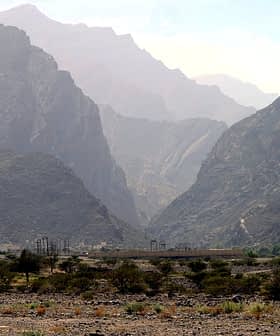Punjab Distributes Nearly Half a Million Olive Saplings to Local Farmers
Punjab's farmers have until tomorrow to submit their applications for free olive saplings.
 Farm in Gilgit Baltistan, Northern Pakistan
Farm in Gilgit Baltistan, Northern PakistanThe Government of Punjab has announced they will provide 473,500 olive saplings free to farmers as part of their five-year project to develop olive groves in the region’s “Olive Valley.” To qualify for the saplings Farmers must meet certain criteria and submit their applications by the tomorrow.
The project aims to promote local production of olive oil and reduce the hefty import bills for edible oils. The Barani Agricultural Research Institute (BARI) advocates cultivating 250 trees per hectare of land with an expected olive oil yield of 600 liters. With the price of olive oil in Pakistan standing at around Rs 500 ($4) per liter, farmers could bring in Rs 300,000 ($2,437) if they used a hectare of their land for growing olives.
The Provincial Agriculture Department have laid down specific rules and procedures that farmers are required to comply with in order to qualify for the imported saplings. Farmers who have adequate irrigation facilities to nurture an olive grove and those who qualify for a 70 percent subsidy towards irrigation are in line to benefit from the free olive trees.
Over a million olive trees have already been planted in the Pothwar region of the Olive Valley, which spreads across; Rawalpindi, Chakwal, Jhelum, the Attock district of Potohar, Mianwali and Khushab, according to BARI.
Earlier this year 120,000 olive trees were planted in Pakistan’s south-west Balochistan province as part of a campaign launched by the Pakistan Agriculture and Research Council (PARC). Half of the saplings were reared in Pakistan and the remainder were imported from Italy.
Back in 2011, the government of Punjab prepared a detailed plan for the promotion of olive growing in the region. The aim was to make Pakistan self-sufficient in olive oil by planting new trees as well as grafting existing wild olive varieties. Farmers were offered training in modern olive cultivation methods and encouraged to produce olives by the agricultural department of the Small and Medium Enterprises Development Authority (SMEDA) in Punjab.
Pakistan took its first serious steps into olive cultivation in 1986 with a project funded by the Italian government. Subsequent olive growing projects have had varying degrees of success.
The Pothwar region in the north-east of Pakistan was earmarked to become an “Olive Valley” after its climate and terrain were recognized as being suitable for olive production. Under a five-year plan initiated by PARC, 2.4 million olive trees are scheduled for planting by 2020.








